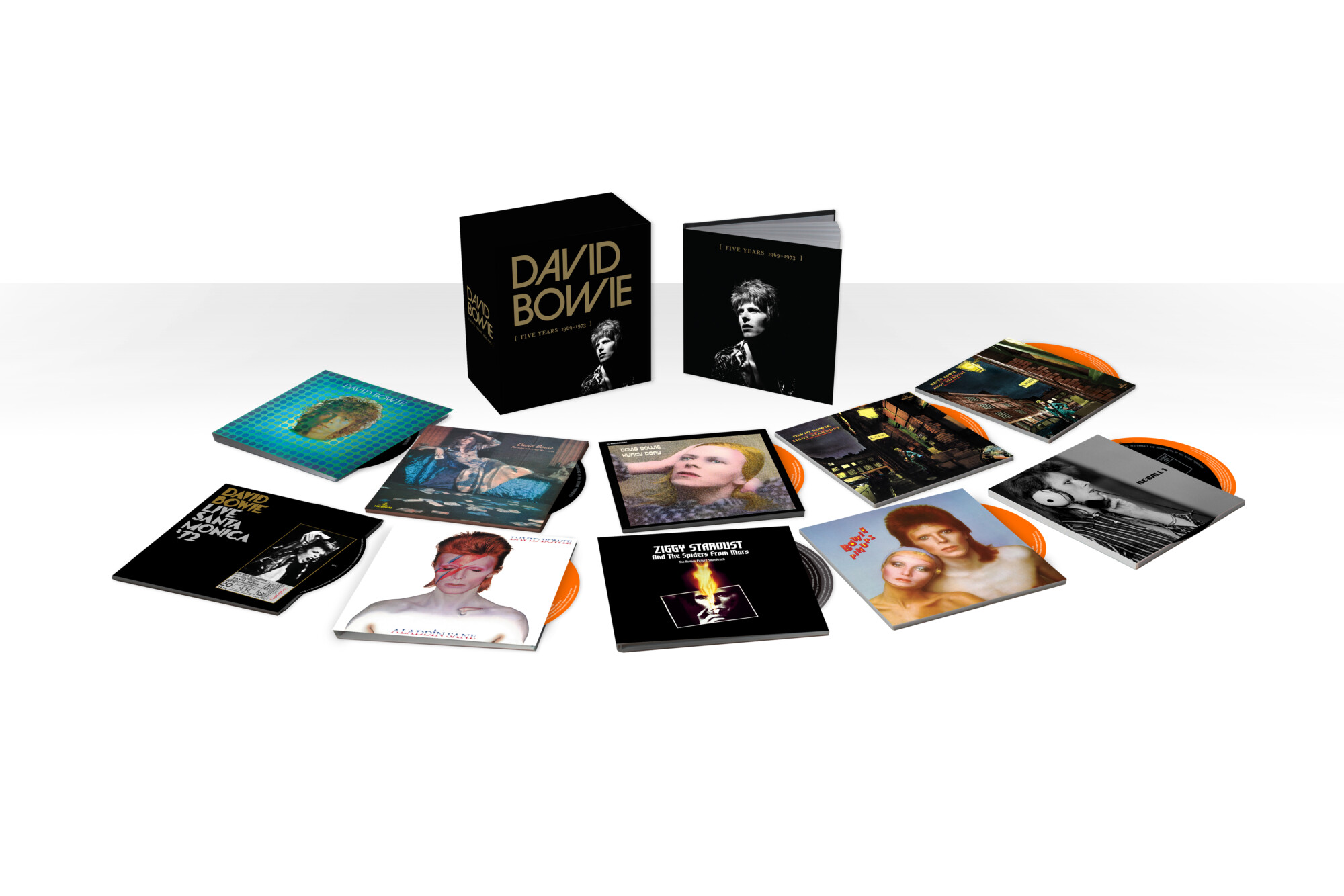David Bowie – ‘Five Years (1969-1973)’
With nearly nine hours of music spread across thirteen 180-gram LPs or twelve gold-layered CDs ‘Five Years (1969-1973)’ summarizes the released work of David Bowie during his early years as he moved from folk rock into the hard/glam rock arena.
The boxed set contains six studio albums, with his classic 1972 LP ‘The Rise and Fall of Ziggy Stardust and the Spiders from Mars’ presented in its original mix as well as the 2003 mix by producer Ken Scott first released in 5.1 surround sound on SACD in 2003 and in stereo at 48 Khz/24 bit on the 40th anniversary edition in 2012. The collection is rounded out by the 2 LP/1 CD ‘Live Santa Monica ‘72’, unreleased until 2008, the 2 LP/2 CD ‘Ziggy Stardust: The Motion Picture Soundtrack’, recorded at the Hammersmith Odeon in London on July 3, 1973, unreleased on vinyl until 1983 and on CD until 2003, and as a special added attraction, exclusive to this set, the 2 LP/2CD ‘Re:Call1’, a twenty four track compilation of non-album singles, single versions and B-sides.
LP/CD one contains the 2015 remastering of the November 14, 1969 release ‘David Bowie’ album aka ‘Space Oddity’. Bowie contributes 12-string acoustic guitar, Stylophone and vocals, joined by Mick Wayne’s lead guitar, Herbie Flowers’ bass, Terry Cox’s drums, Tony Visconti’s flutes and woodwinds and Rick Wakeman’s mellotron on the title track (‘Space Oddity’) which reached #5 on the UK charts upon release, hitting #15 on Billboard and #17 on Cashbox in the US and #16 in Canada when re-released in 1973. Other contributors to the album include guitarist Tim Renwick, Moody Blues bassist John Lodge, producer Tony Visconti on bass and drummer John Cambridge. As for the music, ‘Letter to Hermione’ is a folk rock tune written about Bowie’s girlfriend of the time. Also of note are the melodic tunes ‘Janine’ and ‘Wild Eyed Boy From Freecloud’. The album itself failed to chart on release, but reached #17 in the UK in 1972, giving Bowie a gold record, while peaking at #16 in the US and #13 in Canada in 1973.
LP/CD two presents the 2015 remastering of the November 4, 1970 issued ‘The Man Who Sold The World’, the first album on which Bowie teamed with The Spiders From Mars, at this point comprising of guitarist Mick Ronson and drummer Mick “Woody” Woodmansey, with producer Tony Visconti appearing on bass, piano and guitar, with Bowie adding vocals, guitar and harmonica. Bowie’s first endeavor into the rock arena is presented in a 2015 remastering, and is highlighted by the four minute title track and the eight minute ‘The Width of a Circle’ which would become a mainstay in Bowie’s live set, as well as the rockers ‘All The Madmen’ and ‘The Supermen’. The album peaked at #24 in the UK though reaching only #105 in the US upon release.
LP/CD three presents a 2015 remastering of the December 17, 1971 release ‘Hunky Dory’, with bassist Trevor Bolder now joining Bowie (vocals, guitar, tenor sax, piano), Ronson (guitar and mellotron) and Woodmansey (drums) in what would become the definitive lineup of The Spiders From Mars with whom Bowie recorded three more studio albums, and Rick Wakeman guesting on piano. Ken Scott replaced Visconti as producer, the long player opening with the pop rock influenced, commercially accessible ‘Changes’ which gave Bowie a hit single in the US, peaking just outside the Top 40 at #41. ‘Life on Mars?’ offered another viable single, while the topics of ‘Andy Warhol’ and ‘Song For Bob Dylan’ were especially timely. The band’s blend of a heavier rock sound and commercial hooks pushed the album to #3 on UK charts, achieving platinum status, and broke the US Top 100, peaking at #57, while garnering the band classic rock airplay.
LP/CD four presents the group’s magnum opus ‘The Rise and Fall of Ziggy Stardust and the Spiders from Mars’ in its 2012 remastering. The thirty eight and a half minute album contained eleven tracks, ten written by Bowie along with a cover of Ron Davies’ ‘It Ain’t Easy’, recorded for ‘Hunky Dory’ but not included in the final track listing. From its opening track ‘Five Years’ to its dramatic closer ‘Rock ‘n’ Roll Suicide’ the long player rocks hard, blending psychedelia with hints of folk and forebodings of the soon to come punk rock genre. Ronson’s guitar dominates the soundscape, with Bowie’s lyrics telling the story of an androgynous, self destructive rock star named Ziggy Stardust. The album yielded two UK hit singles, with an edited version of ‘Starman’ reaching #10 in 1972 and ‘Rock ‘n’ Roll Suicide’ peaking at #22 when released in 1974, the former backed by the hot rocking ‘Suffragette City’, which itself would have been an ideal choice as a single release. Along the way Bowie warns of the pratfalls awaiting rock stars in the memorably poignant ‘Hang On To Yourself’. Released on June 16, 1972 ‘The Rise and Fall of Ziggy Stardust and the Spiders from Mars’ peaked at #2 in the UK, achieving double platinum status, and gave the band its US breakthrough peaking at #21, reaching RIAA gold record status.
LP/CD five presents April 19, 1973’s ‘Aladdin Sane’ (presented in 2013 remastering) a hard rocking set of ten tracks, nine Bowie originals joined by a cover of the Jagger/Richards classic ‘Let’s Spend The Night Together’. Bowie contributes guitar, harmonica, saxophone, synthesizer and mellotron to his vocals and Ronson guitar and piano, while Bolder and Woodmansey again supply the tight rhythm section. The long player is dominated by its singles, with the infectiously commercial ‘The Jean Genie’ reaching #2 in the UK and #71 in the US, backed by the LP version of ‘Ziggy Stardust’ and ‘Drive-in Saturday’ peaking at #3 in the UK backed by a cover of Chuck Berry’s ‘Round and Round’ intended for inclusion on ‘Ziggy’, though failing to make the album’s final cut. While a heavily edited version of ‘Time’, another ‘Ziggy’ leftover described as burlesque vamp, and the band’s cover of the Jagger/Richards classic ‘Let’s Spend The Night Together’ failed to chart they garnered the band valuable airplay. ‘Aladdin Sane’ gave Bowie his first chart topping album in the UK, again achieving platinum status, and reached #17 in the US, giving him his second RIAA certified gold LP.
LP/CD six contains Bowie’s last album recorded with The Spiders From Mars, the October 19, 1973 release ‘Pin Ups’ (in 2015 remastering), with Aynsley Dunbar replacing Woodmansey on drums. Bowie contributes vocals, guitar, tenor and alto saxophones, harmonica and Moog synthesizer, Ronson adding guitar, piano and backing vocals with Trevor Bolder remaining on bass, the band aided by Mike Garson on piano, organ, harpsichord and electric piano and Ken Fordham adding baritone saxophone. The album contains glam rock and proto punk covers of tunes by bands that were influential on Bowie as a teen, with two each by The Who (‘I Can’t Explain’ and ‘Anyway, Anyhow, Anywhere’), Pretty Things (‘Rosalyn’ and ‘Don’t Bring Me Down’) and The Yardbirds (‘I Wish You Would’ and ‘Shapes Of Things’) joining tunes originally recorded by Them, Pink Floyd, The Mojos, the Easybeats, the Merseys and the Kinks. Highlights include sprite takes on ‘See Emily Play’ (Pink Floyd), ‘Friday On My Mind’ (Easybeats), ‘Sorrow’ (Merseys) and ‘Shapes Of Things’. The album’s single ‘Sorrow’ peaked at #3 on the UK charts, while the album gave Bowie his second UK chart topper and peaked at #23 in the US, achieving gold status in both cases. There were, however, no more albums from Bowie and The Spiders, as the artist was about to enter the next phase of his career moving away from hard rock toward art rock, R&B and soul music, while retaining an element of glam rock. This phase is documented by the thirteen 180 gram LP/twelve gold-layered CD box set ‘Who Can I Be Now (1974-1976)’ released by Parlophone in September 2016.
‘Five Years’, however, contains another seven LPs/six CDs to be reviewed here, beginning with LPs seven and eight/CD seven ‘Live Santa Monica ‘72’ (in 2008 remastering) recorded on October 20, 1972 at the Santa Monica City Auditorium,but unreleased until July 30, 2008. Bowie on vocals and guitar is joined by Mick Ronson on guitar, bass and backing vocals, Trevor Bolder on bass, Woody Woodmansy on drums and Mike Garson on keyboards. The seventy four minute set is dominated by six tracks from ‘Ziggy Stardust’. The band also performs classics such as ‘Space Oddity’, ‘Changes’, ‘The Jean Genie’ and ‘John, I’m Only Dancing’ as well as shining on extended cuts such as the nearly eleven minute take on ‘The Width of a Circle’ and an almost six minute run through Velvet Underground classic ‘Waiting For The Man’.
LPs nine and ten/CDs eight and nine document ‘Ziggy Stardust: The Motion Picture Soundtrack’ in 2003 remastered form. The recordings come from a July 3, 1973 gig at the Hammersmith Odeon in London which was unreleased until October 1983. The band consists of Bowie (vocals, guitar, harmonica and saxophone), Mick Ronson (guitar), John Hutchinson (guitar), Trevor Bolder (bass), Woody Woodmansy (drums), Mike Garson (piano), Ken Fordham (saxophone) and Brian Wilshaw (horns). Six of the eighteen tunes performed by the group come from ‘Ziggy Stardust’, joined again by takes on ‘Space Oddity’ and ‘Changes’, while ‘The Width of a Circle’ is stretched out to nearly sixteen minutes. Of special note, however, are full takes on the Velvet Underground’s ‘White Light/White Heat’ and Jagger/Richard’s ‘Let’s Spend The Night Together’ as well as a minute and a half run at ‘All The Young Dudes’ the Bowie tune which was a Top 40 hit, and career saver, for Mott The Hoople.
LP eleven/CD ten is the 2003 mix of ‘The Rise and Fall of Ziggy Stardust and the Spiders from Mars’ by producer Ken Scott previously available on 2003 SACD and 2012 vinyl-and-DVD-Audio versions. The sound on the remix is immaculate and will be of special interest to Bowie fans and record collectors.
The real prizes of ‘Five Years’ are LPs twelve and thirteen/CDs eleven and twelve, titled ‘Re:Call1’, consisting of twenty four non-album singles, single versions and B-sides. The collection opens with the original mono single edits of ‘Space Oddity’ and ‘Wild Eyed Boy From Freecloud’. The Italian version of ‘Space Oddity’ is followed by the original mono single version of ‘The Prettiest Star’ with Marc Bolan on guitar, with its b-side ‘Conversation Piece’ closing side one of the first LP. Side two opens with both parts of the ‘Memory of a Free Festival’ single, followed by the previously unreleased mono single edit of ‘All The Madmen’ and the mono version of its b-side ‘Janine’. The original mono single version of ‘Holy Holy’, previously only issued on a 1971 Mercury single is followed by The Arnold Corns single versions of ‘Moonage Daydream’ and ‘Hang On To Yourself’ which close side two of the first LP and the first CD. The mono single versions of ‘Changes’ and its b-side ‘Andy Warhol’ open side one of LP two and CD two followed by the original single mixes of ‘Starman’, ‘John, I’m Only Dancing’ and ‘The Jean Genie’, with the German single edit of ‘Drive-in Saturday’ closing the side of the LP. The single’s b-side ‘Round and Round’ (a ‘Ziggy’ outtake) opens side two of the second LP, followed by the U.S. single edit of ‘Time’. The “sax version” of ‘John, I’m Only Dancing’ (a re-recording) which was considered for inclusion on the ‘Aladdin Sane’ album, and has confusingly replaced the original version on single releases over time. ‘Amsterdam’ a non-album single (recorded during the ‘Ziggy’ sessions) from 1973, released with the album version of ‘Sorrow’ as its b-side is next up, followed by the Spiders from Mars version of ‘Holy Holy’, another ‘Ziggy’ outtake, which was released as the b-side of ‘Diamond Dogs’ in June 1974. The second LP and CD of ‘Re:Call1’ closes with ‘Velvet Goldmine’, yet another ‘Ziggy’ outtake, first issued as the b-side of the 1975 reissue of ‘Space Oddity’, a wonderful ending to an incredibly comprehensive anthology of David Bowie’s works from 1969 through 1973.

The thirteen LPs or twelve CDs of ‘Five Years (1969-1973)’ come in replica or mini-replica cardboard LP sleeves, ‘David Bowie’, ‘Ziggy Stardust: The Motion Picture Soundtrack’ and ‘ReCall1’ in gatefolds. As a bonus, the lyrics to the first five albums are included either as parts of gatefold covers or as inserts and the CDs come in protective plastic sleeves for protection against scratching. The box set comes with a 128 page hardback companion book featuring rarely seen photos, recording essays from producers Tony Visconti and Ken Scott, original press reviews and a short forward by Ray Davies of the Kinks. The box set also includes meticulously compiled musician and production credits. ‘Five Years (1969-1973)’ is absolutely the last word on David Bowie’s recorded and released works during the period covered and will be of interest to fans of Bowie, 1960s and 1970s rock, classic rock, glam rock, hard rock and rock music in general and comes most highly recommended. The love and care put into this release, part of a series of box sets covering Bowie’s career, is obvious and sets the bar high for the volumes to follow.
Kevin Rathert
David Bowie – ‘Five Years (1969-1973)’ (Parlophone Records, 2015)




